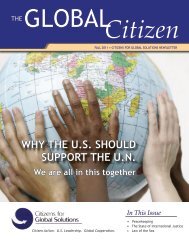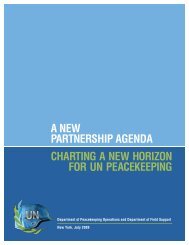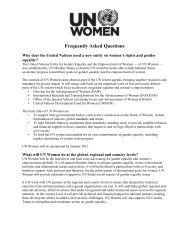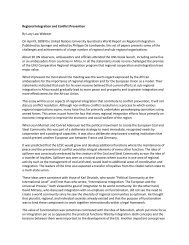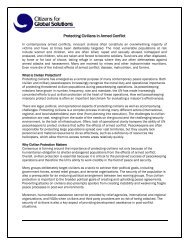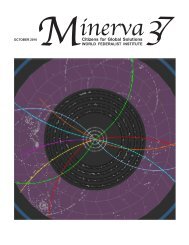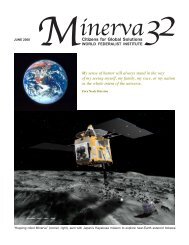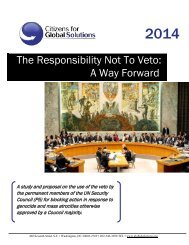From “Imperiled Revolutions”,by Stephen Eric Bronner(RSN Perspective, 24 June <strong>2011</strong>) ~Stephen Eric Bronner is DistinguishedProfessor of Political Science and Directorof Civic Diplomacy & Human Rightsat the Institute <strong>for</strong> <strong>Global</strong> Challenges,Rutgers University, Senior Editor of Logos:A Journal <strong>for</strong> Modern Society andCulture, and author of Peace Outof Reach: Middle Eastern Travelsand the Search <strong>for</strong> Reconciliation,among other works.The Arab Spring was marked by spontaneousrevolts, lack of charismatic leaders,youthful exuberance, and disdain <strong>for</strong>more traditional <strong>for</strong>ms of organizationaldiscipline. That is what made these revolutionsso appealing. Institutional obstaclesto democracy, however, requireinstitutional responses: speaking truth topower is no longer enough. Success nowhinges on the organization of power bythe <strong>for</strong>mer insurgents and their ability todeal with the armed <strong>for</strong>ces, the bureaucracy,religious institutions and the globaleconomy. …Revolution is a daunting task,but running a country the day after is perhapsan even more daunting proposition.New liberal republics in economicallydisadvantaged circumstances will need tonavigate a swirl of conflicting economicinterests and illiberal institutional claims.These are not discrete concerns though, ineach circumstance, the art – not the science– of politics is required to providean integrated set of responses. Ignoringthe logic of power is no solution. Only byconfronting reactionary and exploitativeinterests with an eye privileging the commonneeds of the disenfranchised and theoppressed will a fresh breeze sustain theArab Spring.ïThe United States mustundoubtedly be more consciousof how it appears to others, lesspresumptuous about the advantagesit has enjoyed in the past,and more respectful of the needsand perspectives of other nations.Power and ArroganceBOOK REVIEW:The End of Arrogance:America in the <strong>Global</strong> Competition of Ideasby Steven Weber and Bruce JentlesonDavid ShorrApril <strong>2011</strong>David Shorr is a program officer at theStanley Foundation and a member of theboard of <strong>Citizens</strong> <strong>for</strong> <strong>Global</strong> <strong>Solutions</strong>Education Fund. Co-editor of Bridgingthe Foreign Policy Divide (Routledge)and a contributor to the <strong>for</strong>eign policyblog Democracy Arsenal, he teachesUS <strong>for</strong>eign policy at the University ofWisconsin-Stevens Point.Reprinted from Policy Review,a publication of the Hoover Institution,Stan<strong>for</strong>d University.The most interesting questions <strong>for</strong> US <strong>for</strong>eign policy are variants of the following:How much has the world changed? As America tries to prod world affairs along itspreferred trajectory, how has that task been complicated by new international realities?The debate over whether America is in decline misses the point. The signs of asignificant shift in international power are just too plain and numerous <strong>for</strong> anyone todoubt that the United States faces new challenges in exerting its influence. But again,this leaves plenty of open questions about the nature of those challenges.Steven Weber and Bruce Jentleson’s new book, The End of Arrogance: America in the<strong>Global</strong> Competition of Ideas, tackles these most basic issues head-on. The authors offera bracing assessment of the international environment US policymakers confront. Ifthe first step in overcoming any self-delusion is to recognize that you have a problem,Weber and Jentleson are trying to jolt America out of its self-absorption. Just to stretchthe analogy, consider the book an intervention — its authors giving tough love to fellow<strong>for</strong>eign policy thinkers who are addicted to an outmoded ideology of Americanleadership. They liken the delusion to the Copernican paradigm shift undercutting theimage of the earth at the center of the universe; the United States has lost its politicalgravitational pull.Putting it succinctly, the book answers this essay’s opening question by saying theworld has changed a lot more than we have admitted to ourselves. Assumptions aboutAmerica’s advantages are ripe <strong>for</strong> reexamination. The authors dissect even the milderconceptions of American exceptionalism. In other words, their critique covers conservativesand liberals alike.10 • <strong>Minerva</strong> #39 • November <strong>2011</strong>
Among their targets is the notion thatthe US political and economic modelfaces no significant rivals, because thesupposed contenders have such limitedappeal or applicability. The argumentis indeed familiar — and com<strong>for</strong>ting inits reassurance. The Chinese dynamo ofexport-led state capitalism is very hard toreplicate. The Singapore model dependson its peculiar geography. FundamentalistIslam is too inhuman. Anti-Americanismis a purely negative phenomenon. American-styledemocracy and free marketsare dominant paradigms because no othersare as coherent or systematic or canmatch their record of success.But this is a false com<strong>for</strong>t, Weber andJentleson argue. The main fallacy —aside from the stubborn fact of China’seconomic success — is that only universallyapplicable, all-encompassing theoriescan contend as rivals. In other words,while America presumes that it has wonthe grand historical argument about governanceand economic management, wehave misunderstood how that argumentplays out in the real world of global politics.Resistance to American leadershipand the emergence of counter-argumentsdon’t need to be undergirded by fullyworkable ideologies.So it is a mistake to view American approachesas vying in a war of ideas, inwhich one model decisively vanquishesanother. And despite the use of the Copernicanrevolution as a reference point, thebook also warns against the image of scientificadvances, with theories gaining acceptancedue to their superior explanatorypower. A much better analogy <strong>for</strong> how itworks, say the authors, is the competitionof the commercial marketplace.In his recent state of the union address,President Obama adopted similar themesof American economic dynamism asstrengthening national competitiveness,but End of Arrogance is a methodicalreconception of US <strong>for</strong>eign policy challengesin terms of the global competitionof ideas. A main thread of the book is towarn against taking anything <strong>for</strong> granted,beginning with the “five big ideas [that]shaped world politics in the twentieth century”:the preferability of peace to war;benign (American) hegemony to balanceof power; capitalism to socialism; democracyto dictatorship; and Western cultureto all others. Jentleson and Weber portrayan international order that is up <strong>for</strong> grabsat the beginning of the 21st century. Theirclaim that nations and leaders are workingwith a clean slate probably overstatesthe case, but most of the book charts acredible course to renewed US globalleadership.The heart of the book’s first section describesessential market dynamics andkey principles:In a functioning modern marketplace ofideas, at least three things are true of atwenty-first-century leadership proposition.First, we offer, but they choose. Amarket leader is fundamentally more dependenton the followers than the followersare on the leader . . . Second, the relationshipsare visible and consistency isdemanded. Market leaders don’t dependheavily on private deals and subterfuge tohold their bargains in place . . . Finally,there is real competition. Markets are relentlessin their ability to generate newofferings.The authors describe some key challengesin the contemporary marketplace, all ofwhich lower the barriers to entry <strong>for</strong> ourcompetitors. They highlight the revolutionin in<strong>for</strong>mation and communicationstechnology, demographic trends that fillmegacities with young people whoseworldview is non-Western, the openingsprovided by the diffusion of authority,and the permeability of national borders.The section concludes with a sobering assessment:In 2010, globally, there remains a deepskepticism about the proposition that theUnited States can be more powerful andthe world can be a better place at thesame time. The belief that these two thingscould be consistent or even rein<strong>for</strong>ce eachother was the most valuable and preciousadvantage America had in the post-WorldWar II milieu. It has eroded and thatchanges the nature of ideological competitiondramatically. A new <strong>for</strong>eign policyproposition has to find a way to put thatbelief back into play.11 • <strong>Minerva</strong> #39 • November <strong>2011</strong>A stark, yet apt, summary of our currentstrategic challenge.The book’s middle two chapters outlinethe substance of leadership propositionsthe United States could offer as a basis<strong>for</strong> equitably just societies domesticallyand new political terms <strong>for</strong> internationalorder. Since the authors’ project is to shedthose conceits that represent the toughest“sell” <strong>for</strong> the hegemon, their leadershippropositions have a distinctly strippeddowncharacter. In place of democraticideology — electoral competition and thepopular mandate — the essential elementsof a just society are the empowerment ofpeople to lead fulfilling lives and protectionof the vulnerable, those buffeted by<strong>for</strong>ces of rapid change such as extremeweather, industrial accidents, or spikes inthe price of staple foods.As the authors step out of ingrainedAmerican worldviews to gain perspectiveon democracy, they make a compellingpoint about the weaknesses thatothers perceive. After all, democracy isa decision-making process rather than atangible benefit <strong>for</strong> people’s lives. In thewide swath of the world where daily lifeis a grinding struggle, to idealize processand treat material conditions as secondaryand contingent must seem exotic.Just as the book proposes revised standardsof good governance, it issues asimilar challenge to recast the internationalpolitical order. Again the root ofthe problem is complacency; Americansare still trying to dine out on our authorshipof the post-World War II order whenthe resonance of that creation myth hasfaded. Rather than dismissing the merenotion that the postwar order could be (orhas already been) upended, we should tryto get out ahead of the revision process.One of the authors’ refrains is that whilethe US political elite is consoling itselfthat “there is no alternative”, much of therest of the world is insisting that “theremust be an alternative”.The leadership proposition that Weberand Jentleson put <strong>for</strong>ward is a responseto the interconnected 21st-century world,and rightly so. The difficulty is that theprecursors <strong>for</strong> a peaceful and prosperous



